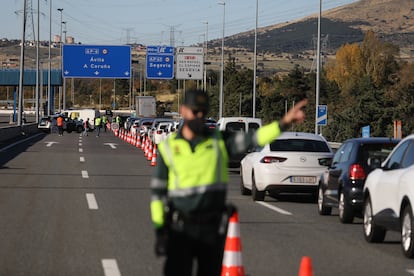Control of the Civil Guard in the AP6, on the border between the Community of Madrid and Castilla y León, last Easter. Victor Sainz
The Government hopes that it will not have to extend the state of alarm beyond May 9, the date on which the six-month extension decreed last November ends.
From then on, the Communities will once again have the reins of the measures they implement in their territory to fight against the virus, as happened between mid-June and October last year, after the state of alarm was lifted and the regional executives assumed control to manage the so-called new normal.
That first attempt at decentralization resulted in a trickle of judicial decisions, often contradictory, a situation that several consulted jurists fear will be repeated now, since, without the umbrella of the state of alarm, all the limitations of fundamental rights adopted by the Communities require a judicial endorsement.
The reference standard that can be invoked by the regional governments to impose measures against the virus is Organic Law 3/1986, on Special Measures in Public Health Matters, which allows health authorities to adopt "the measures deemed necessary" to control communicable diseases.
Many jurists have warned in recent months of the need to reform this law to specify what measures the communities can adopt without having to submit to the control of the courts and thus avoid the legal chaos that was experienced last summer, but the Government has not considered necessary to undertake this reform, so the regional executives will foreseeably return to look for formulas to combat the virus depending on how the health crisis evolves and the judges will once again have the responsibility of deciding whether to endorse or revoke them.
The current state of alarm mainly regulates three measures that imply the limitation of fundamental rights: the curfew, the perimeter closures and social gatherings.
The only one that, according to the Government and most of the experts consulted, cannot be maintained without this legal coverage is the curfew, so the end of the state of alert will end the night confinement that has been in force since October.
However, if any Community wanted to maintain it or reinstate it after a few months, it could try invoking the 1986 law and await the response of the judges.
There are fewer doubts about the powers of regional executives to restrict entry and exit within their Community and limit the permanence of groups of people on the street or closed areas.
The Communities will be able to delimit the entire autonomous territory or establish smaller perimeters, between provinces, municipalities or even neighborhoods, as several regional governments did last summer.
They may also, with judicial permission, restrict the maximum number of people in social gatherings, both indoors and outdoors.
Most communities are cautious about the possible end of the state of alarm
Other measures that regional governments are frequently resorting to, such as the closure of the interior of bars and even the suspension of all non-essential activities, do not imply the restriction of fundamental rights, and therefore do not require coverage of the state of alarm. nor judicial authorization.
The same occurs with the closure of public spaces such as parks or the limitation of hours in stores or hotels.
The Communities may impose these measures without waiting for the permission of the judges, although any of them may be appealed in court.
The Government has not made progress, for now, if it intends to approve this time some rule that establishes common measures for the entire territory, as it did last summer, when the end of the state of alarm was accompanied by a decree approved in Congress in which Some general aspects were regulated, such as the mandatory use of a mask or a social distance of 1.5 meters in public spaces.
It is also pending to specify the role that the Interterritorial Health Council will assume as of May 9.
The Government insists that the decisions adopted in this body are mandatory for all regional executives, which has served to impose common restrictions, such as perimeter closures at Christmas or Easter, and circumvent the opposition of some Community, especially Madrid .
Once the state of alarm is lifted, this body could also provide legal coverage for measures that may exceed regional powers.

